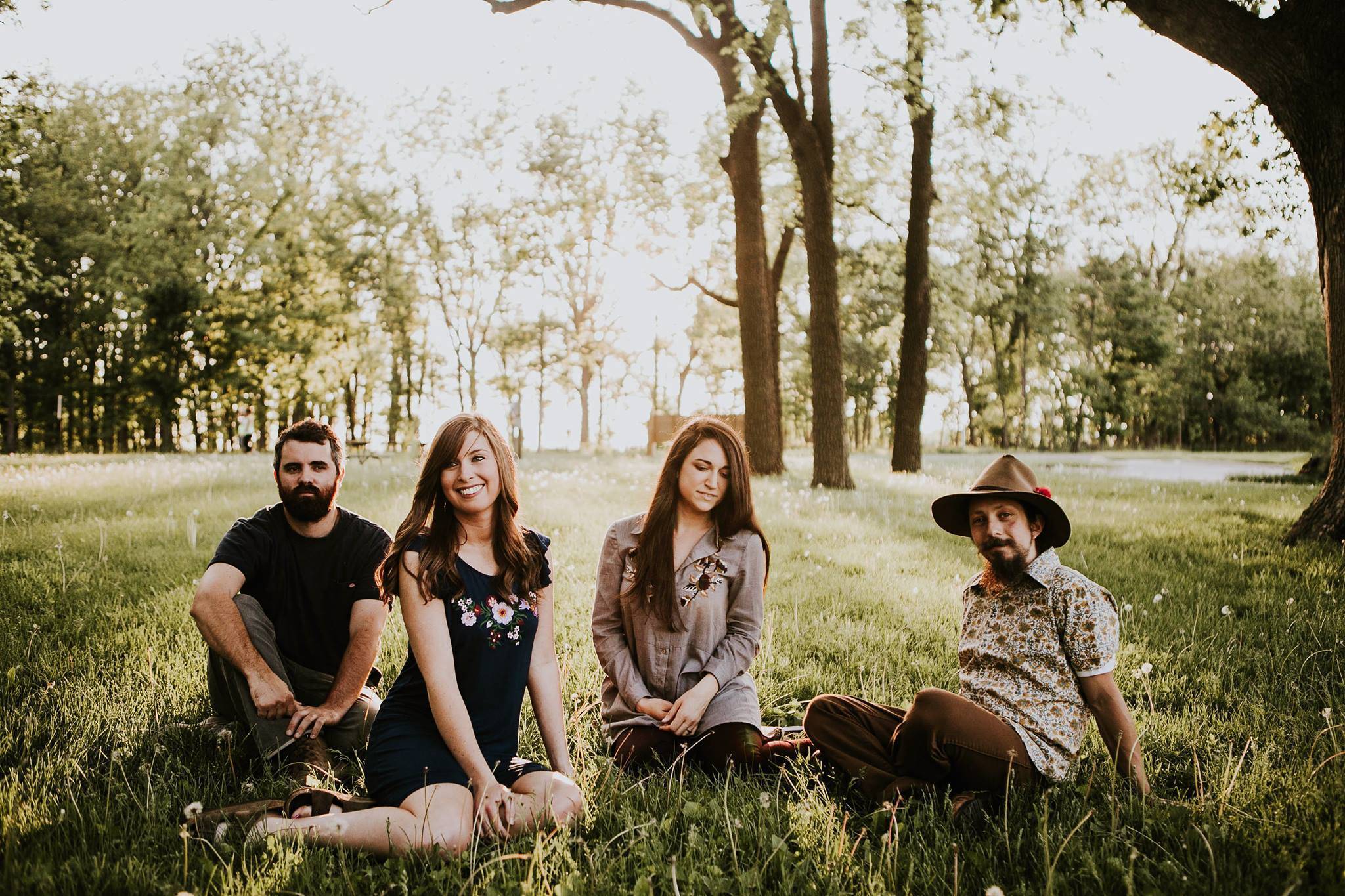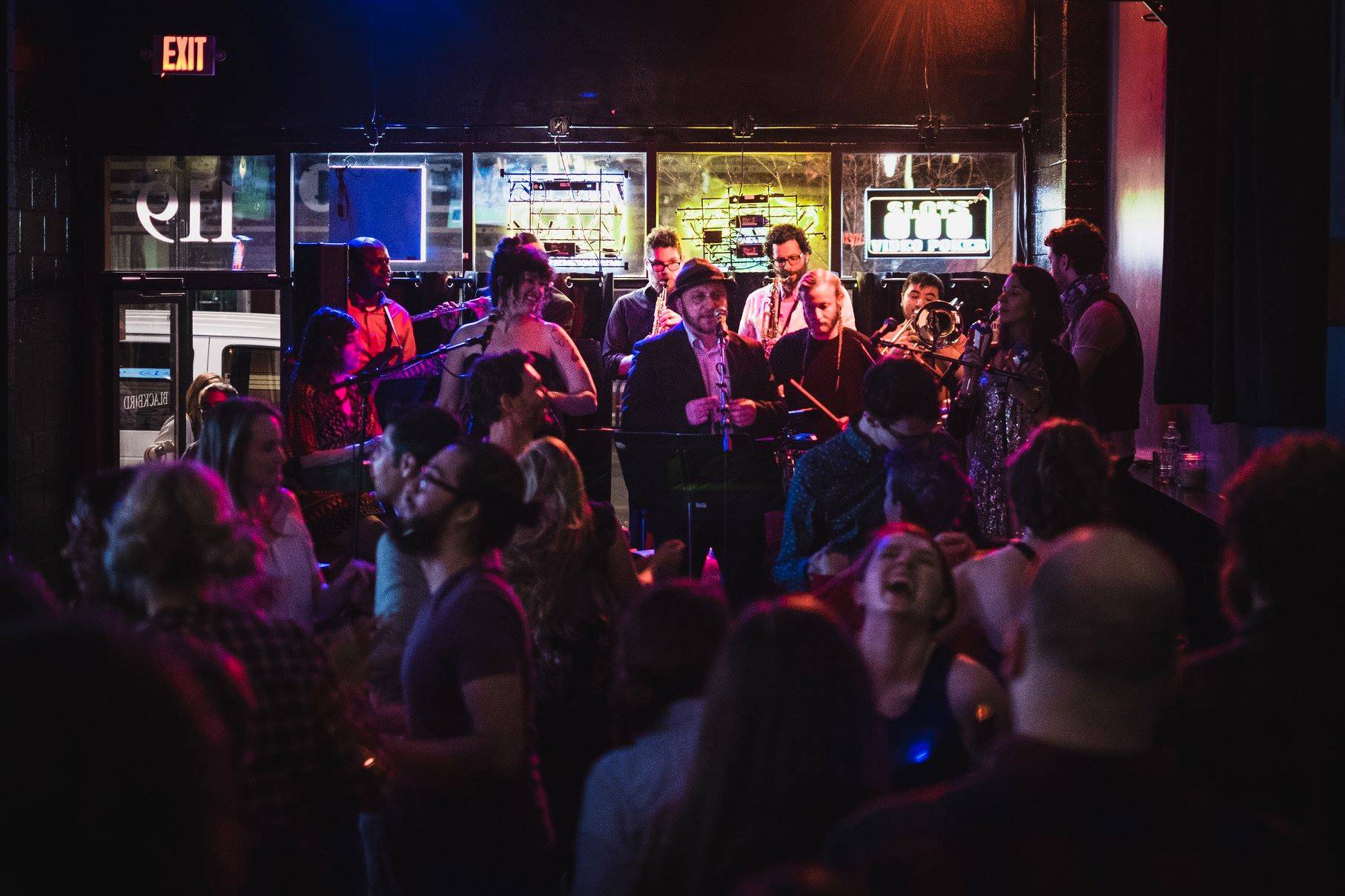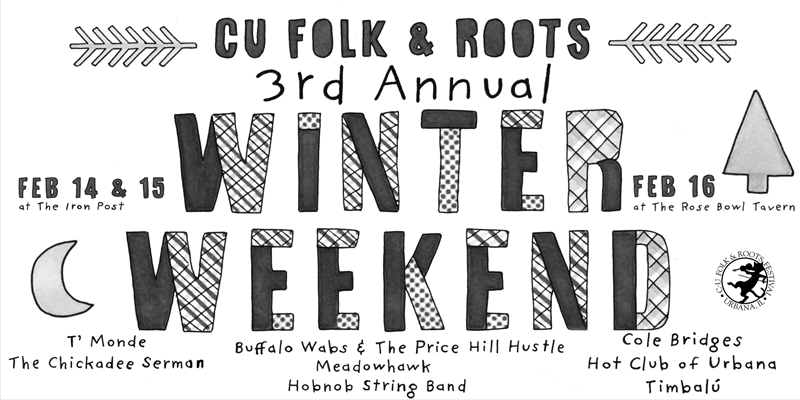Coming up the weekend after Valentine’s Day, Downtown Urbana has a real special treat on offer for music lovers with the third annual C-U Folk & Roots Festival‘s Winter Weekend, a three-night mini music festival taking place across two of Urbana’s hallowed but humble stages. The Iron Post is known for its non-stop schedule of live music of unparalleled variety. And just a block and a half down Race Street at The Rose Bowl Tavern, the time capsule of a country bar complete with a railing to block patrons from easy access to the stage, the stage is known for hosting the Monday night open mics called the Urbana Hootenanny and regular country shows.
C-U Folk and Roots is a volunteer run organization that’s been putting on a fall festival for 10 years now, in addition to sponsoring events throughout the year. In recent years, they’ve added a mini festival to the schedule in the winter, and like the fall festival, it takes place in Downtown Urbana. I met up with one of the volunteers who helped set up the event and will be performing in a couple bands on the weekend’s bill, Charlie Harris, aka Cosmic Charlie.
Smile Politely: What is “folk” to you? It’s not just acoustic guitars and stuff, right?
Charlie Harris: It’s not just acoustic music but it often finds itself as acoustic music. I’ve heard it described as music of the people or by the people. I think it lends itself to acoustic instruments because they are more easily incorporated into everyday activities. An acoustic guitar, or whatever acoustic instrument, can just be sitting next to you on the couch and you just pick it up and play it. You don’t need to set up a microphone or plug in anything. You could be out in the woods. Folk and roots are vague, sort of ambiguous terms. So rather than taking those terms and have them define a sound that’s very specific, what we’re trying to do with the festival is blast it wide open.
SP: How does C-U Folk and Roots represent the folk music of this area — or how is it connected to the area’s folk music history?
Harris: That’s a good question. I wouldn’t consider myself the best person to answer the question because I’m not from here. What I do know is that the 2018 Folk and Roots festival was the 10 year anniversary of the festival, and the people that started it include people that have been performing or been connoisseurs of different types of folk music in this area for a long time. Particularly Tom Turino was one of the people that started the festivals and he was a musicologist at the university. And then someone that played our fest this year is this guy, Billy Mathews. He is primarily a fiddle player, performer, but he has by nature of doing it for so long — I think he’s almost 90 or in his 90s — he’s put together this great catalog of uniquely Illinois fiddle music.
SP: What do you think will happen with folk music, a genre rooted heavily in the past, as we continue dredging further into an increasingly modernized world?
Harris: I think like anything, particularly in the arts, every individual is going to have their own opinion, or their own taste. And so some people are always going to want it to sound just like it was. And some people, just at the sound of a banjo might just gag. A lot of people have a love-hate thing with it, maybe more of a hate thing sometimes. I love the thing. But I hope and I think that some of these elements from these different traditions — just to name a few that we’re featuring at the mini-fest, you have the cajun music tradition, the bluegrass tradition, the salsa tradition, the country tradition, the singer songwriter. There’s all these different nuances that make them what they are, and I personally hope and I think that we’ll see how these styles can move forward with fusing together contemporary styles. In the bluegrass world, we’ve seen things like new grass and jam grass and many different versions of that.
Groups like The Infamous Stringdusters and Greensky Bluegrass have become really popular. And then you talk about bands like Mumford & Sons have become immensely popular and taken the banjo around the world, and I’ve heard it referred to as arena folk. It still has banjo and some of the forms of folk music. You had mentioned modernizing — here’s something that I think is really interesting. Let’s say someone’s really into bluegrass, now in this modern world they can look up a video of any bluegrass player, they can look up any person around the world that’s teaching thing song or that, and then they can also in the same hour they can look up people that are just as nuanced in classical music, or funk music, or whatever. So all of the sudden you don’t have to spend so much time devoted to one thing to go deep. With a little wherewithal and a few clicks you can dive deep into the depths of many things so easily.
SP: You’ll be performing Thursday night at the Iron Post, tell me about the opening night.
Harris: I play standup bass with The Chickadee Sermon, which is quartet featuring Jennifer Hood and Olivia Tasch. Songs that they write and they sing beautifully together. They’ve sang together for years and years so it heavily features their harmonies. And Mike Tasch plays banjo. Olivia and Jenn both play guitar as well. Chickadee is what we call “comfort folk”. Very mellow, very soft. In terms of the experience, if people are familiar with Gillian Welch, or a similar softness to like what the Fleet Foxes do but not as big of an ensemble. Just like so soft you could sink into it.

The Chickadee Sermon, photo by Anna Longworth
SP: And then T’Monde is a touring band from Lafayette, Louisiana. How’d you guys decide on them?
Harris: C-U Folk and Roots is a volunteer run organization, and one of the volunteers is really into Cajun music so it caught his eye and he was like ‘we should book them’. While Chickadee is extra soft, T’monde I wouldn’t say is heavy by any stretch, but they are energetic definitely.
SP: Then on Friday night you’re performing again.
Harris: Yep, I play with the Hobnob String Band, which is sorta bluegrass trio, sorta “new grass”.
SP: And that’s got Sam Payne on guitar and Cody Jensen too — what does Cody play in Hobnob?
Harris: Mandolin.
SP: And you said it’s a “new grass” style. So, it’s with that virtuosic style of playing — you probably wouldn’t say virtuosic out of humility but that intricate style of playing…
Harris: Well, I can say that for Cody and Sam for sure. For sure.
SP: Meadowhawk is one I’ve only seen clips of, playing their fiddles, have you seen them?
Harris: Yeah, I personally consider Meadowhawk a staple of the Urbana music scene. It’s three fiddle players, two of which play at any one time, doing a combination of their own arrangements of traditional and contemporary songs. And they do their original tunes that they’ve written. That’s a happy hour show from 5 ’til 7 p.m.. It’s the perfect music for dancing or listening attentively or if you have a crew out and you’re just hanging.
SP: And how would you describe the Buffalo Wabs?
Harris: Buffalo Wabs & The Price Hill Hustle really have what I think people are calling Americana. They have that sound that’s got this driving beat.
SP: So they have percussion?
Harris: Yeah, they have a percussionist that plays a makeshift drum set and some washboard. They feature vocal harmonies and interesting songwriting and interesting dynamics.
SP: And then on the last night at the Rose Bowl we start out with Cole Bridges, and he’s doing singer songwriter stuff, right?
Harris: So actually he was on a tour with his band The Overpass, and I think they are going to join him on that show, which is cool. And Cole and The Overpass make up some of what was The Fights.

Timbalú, photo by JP Gougen
SP: So then we’ve got Hot Club and Timbalú, which those 2 bands are like a combined 20 people.
Harris: Both Timbalú and Hot Club are bands that have a large draw, so it’s super exciting that they could both do it on the same night. So we moved it over to the Rose Bowl for a few reasons. One: to get a change of venue for fun, and then two: because the space is bigger. The stage is bigger, but when you’re talking about 10 people in a band — we’ll see what happens.
C-U Folk & Roots Festival’s Winter Weekend takes place February 14-16 at the Iron Post and Rose Bowl Tavern in Downtown Urbana. Follow event updates on Facebook, and get your tickets here.








